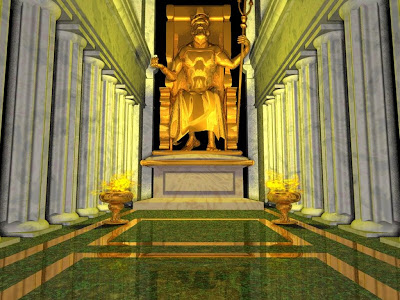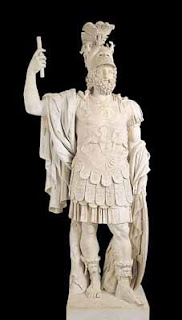The Mariner
Chapter 6
The mariner walked back towards the waterfall, the call of tropical birds echoing in his ears. The sun-dappled jungle floor was alive with insects and tiny creatures.
Such a beautiful place to be, he thought,
but not against my will… Why does Murzium keep me here? Could he really be that lonely?It was a mystery to him. Loneliness was foreign to the mariner. After his father walked out on the family when he was very young, he taught himself not to get attached to the company of others. Since then, he could only remember being lonely once in his life, and the woman who made him feel that way was in a grave not 48 hours later.
Suddenly, a sound. An animal calling so strange and beautiful, it took his breath away. It was a rhythmic, almost melodic warbling—a tone too low to be made by a bird. There, on the lower branches of a willow tree, sat a squirrel. It had a lush coat of reddish gold, like that of a fox. The hair on its head stuck up like ruddy flames in a V-shape. It made the warbling sound again, cocking his head to one side. The creature didn’t have the nervous twitch most squirrels possessed. It called out once more, then leapt across the branches and up the adjacent hill.
The mariner diverged from his path, following the enchanting creature away from the waterfall. He climbed over a rocky ridge and spied a beach he had never seen before. Unlike the one where his boat was docked, this beach was small and pebbly. Nearby were some young coconut trees, which he shimmied up and trimmed. He split the coconut the way the islanders at Yamdena taught him, then slurped the sweet, clear juice inside. When it was done, he scooped out the slippery meat. It tasted good. It had been a long time since he had a coconut.
When lunch was done, he lay in the grass beyond the beach and stared up at the sky, blue as his own two eyes. A cloud passed over that looked like a flying fish. It reminded the mariner of a time when he lived with the sea gypsies at Yamdena and they told him their legend concerning that creature.
* * *
Long ago, before Man appeared on the face of the Earth, there was a very beautiful and very proud bird called the Pulau. The Pulau was dignified and gracious and had a plume of feathers on his head that every other animal envied. But the Pulau knew his position in the hierarchy of things, only too well. He bragged relentlessly to all the other species about how he alone could fly the fastest; he alone could soar the highest; he alone possessed a coat that every other animal would kill for. And they hated him, because they knew he was right.
But there was no other family the Pulau was crueler to than the Fish. He would mock them mercilessly, flying low over the surface of the Sea everyday, displaying his stalk of feathers and calling out to the fish, “Don’t you wish you soar the skies and touch the Sun? Don’t you wish you could move as quick as the Wind and quiet as the Dawn? Don’t you wish you could feel the air rushing through a set of feathers so beautiful, so rare, even the Leopard burns in jealousy? Don’t you, hmm? Well, don’t you?”
Every living thing in the sea hated him for it. And so one day, when the Pulau was gliding low over the sea and mocking, Phlaxis, the god of the Sea, reached his arm into the air and grabbed the Pulau and pulled him deep, deep underwater and held him captive there.
When Perse, the god of the Sky, found out about the Pulau’s imprisonment, she was secretly happy the loudmouth had finally gotten his due, but at the same time she couldn’t allow for such an injustice. As was her duty, she went to meet Phalxis and plead a case for the bird.
She said, “Dear brother, you know as well as I, a bird belongs to the sky. No matter how vain he be, he cannot be kept in the sea. The Pulau must fly again—such was Creation’s intent.”
And in the fashion of many gods of that early age, Phalxis agreed… on his own terms. In accordance with his sister’s wish, he turned the Pulau into the Flying Fish, so that although he would fly again, he would never soar, and he would never glide. He would merely float a breath above the surface of the water—just enough to remember how agile he once was, and how far from grace he had fallen.
* * *
The cloud floated on, and the low, warbling sound roused the mariner from his daydream. He turned and saw the squirrel sitting on a large boulder at the edge of the jungle.
“You again?”
The squirrel voiced a reply in its squirrel language and the mariner smiled. He walked towards the boulder, and the creature disappeared into the brush. Near where the squirrel was sitting, the mariner found a very peculiar looking plant. It had long, thin leaves and red flowers with white streaks shooting from their center like lightning. Though he couldn’t put his finger on it, the plant very curious, as if it had an energy all its own... After caressing it, he smelled his fingers. Cloves.
There was an overgrown path nearby that ascended steeply into the thickest part of the jungle and stretched towards the island’s single peak. He followed it for a while, the heat of the afternoon making the concave space between his breasts moist. He pushed on, making his way hand over hand through a forest of trees with fruit that tasted like pomegranates. After hiking the arduous trail for an hour, the trees thinned out and he came to a promontory that overlooked a huge expanse of sea. To the east, there was another island that seemed smaller than the one he was on. Other than that, it was water—as far as the eye could see. He took off his damp shirt, and while hanging it from the waistband of his pants, he saw it.
Beside the side of the path, where the rainwater had turned the dirt into a thick mud, there were animal tracks. They were small at first—a four-legged creature with claws—but in a matter of paces, they grew grotesquely, becoming almost human size before disappearing into the rocks. The mariner’s blood ran cold.
“Hello, stranger,” said a voice.
The mariner jumped. Looking up, he saw a sprightly young man sitting on a thin ledge several meters above the clearing. His reddish golden hair flew strait up like horns in a V-shape, and he had strange, grey eyes. He wore dark overalls and had hairy feet ending in menacing claws.
“Welcome to the neighborhood,” it said. Then it smiled, revealing a brilliant set of fangs. “Have lunch yet?”

 Freud and Jung had an interesting take on Roman and Greek mythology. They looked at these gods and likened them to facets of our personalities. They proposed that these characters were archetypes from the collective unconscious, and the tales they existed within embodied universal truths that were universally relatable. Freud and Jung then went one step further and posed the question—could not these gods be the emotions and feelings that we experience on a daily basis? Perhaps Mars, the god of war was simply another way of understanding aggression, and so when the Romans spoke of him, they simply referred to a person being consumed with rage. Perhaps by personifying this emotion, it helped the ancient Greeks understand themselves and how they related to the universe around them, just as the mythology of Jesus helps modern Christians participate in the divine.
Freud and Jung had an interesting take on Roman and Greek mythology. They looked at these gods and likened them to facets of our personalities. They proposed that these characters were archetypes from the collective unconscious, and the tales they existed within embodied universal truths that were universally relatable. Freud and Jung then went one step further and posed the question—could not these gods be the emotions and feelings that we experience on a daily basis? Perhaps Mars, the god of war was simply another way of understanding aggression, and so when the Romans spoke of him, they simply referred to a person being consumed with rage. Perhaps by personifying this emotion, it helped the ancient Greeks understand themselves and how they related to the universe around them, just as the mythology of Jesus helps modern Christians participate in the divine. 
















